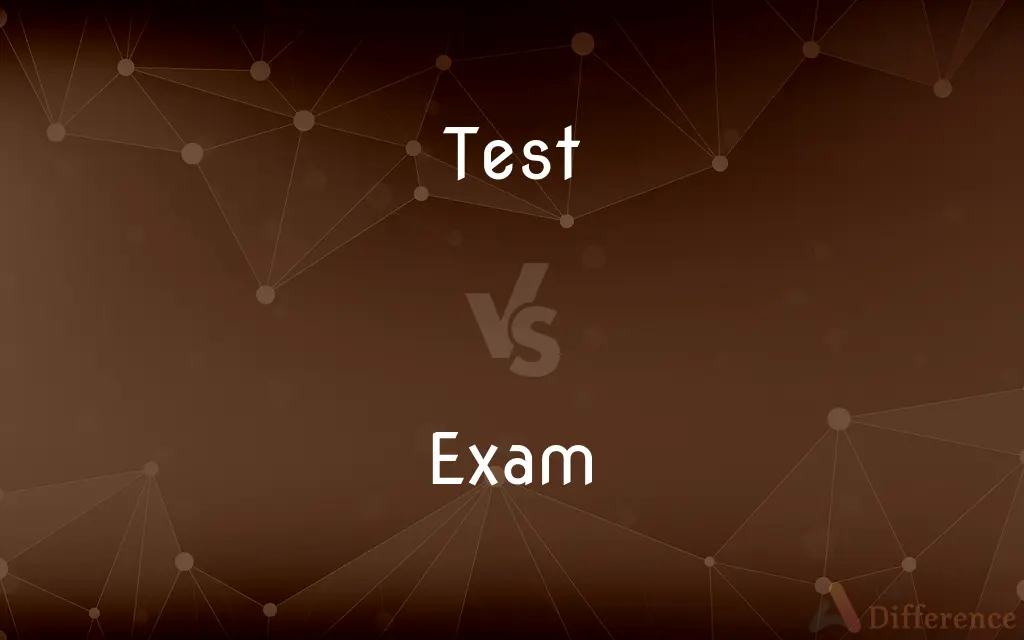Test vs. Exam — What's the Difference?
Edited by Tayyaba Rehman — By Urooj Arif — Updated on March 11, 2024
A test often assesses a specific skill set or knowledge area, while an exam is more comprehensive, covering a broader range of subjects or concepts.

Difference Between Test and Exam
Table of Contents
ADVERTISEMENT
Key Differences
Tests are usually shorter assessments focused on specific topics or skills, aimed at measuring a student's understanding or proficiency in that particular area. They can be frequent and less formal, serving as a tool for both teaching and learning, allowing instructors to gauge the effectiveness of their teaching and students to identify their strengths and weaknesses. Exams, on the other hand, are more formal and comprehensive, often used as a culminating assessment at the end of a course or unit. They cover a wider range of material and are designed to evaluate a student's overall understanding and mastery of the subject.
While tests can be administered in various formats, such as quizzes, assignments, or practical assessments, exams are generally more standardized in their format, which may include multiple-choice questions, essays, or practical tasks. This standardization helps in maintaining consistency and fairness in evaluating students' performance across different institutions and educational systems.
One key difference lies in the level of stress and preparation associated with each. Tests, being more frequent and focused, might not induce as much anxiety as exams, which are often seen as high-stakes assessments that can significantly impact one's academic and professional trajectory.
In terms of feedback, tests provide an opportunity for immediate and specific feedback, enabling students to improve continuously. Exams, while also offering feedback, tend to do so in a more summative manner, summarizing a student's performance over an entire course or period.
Comparison Chart
Scope
Narrow, focuses on specific topics or skills
Broad, covers a wide range of material
ADVERTISEMENT
Frequency
Can be frequent and regular
Typically at the end of a term, semester, or course
Format
Varied, including quizzes, practicals, assignments
More standardized, including essays, MCQs, practicals
Weight
Generally carries less weight
Has significant impact on final grades or qualifications
Stress Level
Often lower due to regularity and specificity
Higher due to comprehensive coverage and higher stakes
Compare with Definitions
Test
An evaluation conducted to gauge a specific skill set.
The driving test assesses an individual's ability to operate a vehicle safely.
Exam
A formal assessment covering a broad range of subjects or skills.
The final exam included questions from all chapters covered during the semester.
Test
A method of assessing a student's knowledge or ability in a particular subject.
The math test focused on algebra and geometry problems.
Exam
A comprehensive test at the end of a course or term.
Students spent weeks preparing for their history final exam.
Test
A short assessment used to measure skills or understanding.
The weekly vocabulary test helps students retain new words.
Exam
An assessment used to determine a student's mastery over a subject.
The bar exam evaluates a law graduate's readiness to practice law.
Test
A means to diagnose learning needs or areas for improvement.
The diagnostic test identified areas where students needed additional support.
Exam
A standardized method of evaluating academic achievement.
National level exams standardize student assessment across schools.
Test
A tool for teachers to understand student progress.
Periodic science tests provide insights into students' grasp of the concepts.
Exam
A high-stakes test that can influence academic or professional paths.
The entrance exam determines admission to prestigious universities.
Test
A procedure for critical evaluation; a means of determining the presence, quality, or truth of something; a trial
A test of one's eyesight.
Subjecting a hypothesis to a test.
A test of an athlete's endurance.
Exam
An examination; a test.
Test
A series of questions, problems, or physical responses designed to determine knowledge, intelligence, or ability.
Exam
(informal) examination, especially when meaning test or in compound terms.
Test
A basis for evaluation or judgment
"A test of democratic government is how Congress and the president work together" (Haynes Johnson).
Exam
(sciences) Shortened form
Test
(Chemistry) A physical or chemical change by which a substance may be detected or its properties ascertained.
Exam
A set of questions or exercises evaluating skill or knowledge;
When the test was stolen the professor had to make a new set of questions
Test
A cupel.
Test
A hard external covering, as that of certain amoebas, dinoflagellates, and sea urchins.
Test
To subject to a test; try
Tested the pen by scribbling on scrap paper.
Testing job applicants.
Test
To reveal the degree of (a given quality) in someone or something by or as if by means of a test
The experiment tested the rats' ability to solve spatial problems. The long war tested the country's resolve.
Test
To identify the presence or amount of one or more substances in
Tested the water for lead.
Test
To identify the amount of (a substance) in something
Tested the nitrogen and phosphorus in the soil.
Test
To ascertain the properties of
Tested the steel for hardness and tensile strength.
Test
To assay (metal) in a cupel.
Test
To undergo a test.
Test
To administer a test
Test for acid content.
Test for the presence of an antibody.
Test
To achieve a score or rating on tests
Tested high on the entrance exams.
Test
To exhibit a given characteristic when subjected to a test
Test positive for the tubercle bacillus.
Test
A challenge, trial.
Test
A cupel or cupelling hearth in which precious metals are melted for trial and refinement.
Test
(academia) An examination, given often during the academic term.
Test
A session in which a product, piece of equipment, or system is examined under everyday or extreme conditions to evaluate its durability, etc.
Test
A Test match.
Test
(marine biology) The external calciferous shell, or endoskeleton, of an echinoderm, e.g. sand dollars and sea urchins.
Test
(botany) Testa; seed coat.
Test
(obsolete) Judgment; distinction; discrimination.
Test
(obsolete) A witness.
Test
Testosterone
Test
To challenge.
Climbing the mountain tested our stamina.
Test
To refine (gold, silver, etc.) in a test or cupel; to subject to cupellation.
Test
To put to the proof; to prove the truth, genuineness, or quality of by experiment, or by some principle or standard; to try.
To test the soundness of a principle
To test the validity of an argument
Test
(academics) To administer or assign an examination, often given during the academic term, to (somebody).
Test
To place a product or piece of equipment under everyday and/or extreme conditions and examine it for its durability, etc.
Test
(copulative) To be shown to be by test.
He tested positive for cancer.
Test
(chemistry) To examine or try, as by the use of some reagent.
To test a solution by litmus paper
Test
To attest (a document) legally, and date it.
Test
To make a testament, or will.
Test
A cupel or cupelling hearth in which precious metals are melted for trial and refinement.
Our ingots, tests, and many mo.
Test
Examination or trial by the cupel; hence, any critical examination or decisive trial; as, to put a man's assertions to a test.
Test
Means of trial; as, absence is a test of love.
Each test every light her muse will bear.
Test
That with which anything is compared for proof of its genuineness; a touchstone; a standard.
Life, force, and beauty must to all impart,At once the source, and end, and test of art.
Test
Discriminative characteristic; standard of judgment; ground of admission or exclusion.
Our test excludes your tribe from benefit.
Test
Judgment; distinction; discrimination.
Who would excel, when few can make a testBetwixt indifferent writing and the best?
Test
A reaction employed to recognize or distinguish any particular substance or constituent of a compound, as the production of some characteristic precipitate; also, the reagent employed to produce such reaction; thus, the ordinary test for sulphuric acid is the production of a white insoluble precipitate of barium sulphate by means of some soluble barium salt.
Test
A set of questions to be answered or problems to be solved, used as a means to measure a person's knowledge, aptitude, skill, intelligence, etc.; in school settings, synonymous with examination or exam; as, an intelligence test. Also used attributively; as a test score, test results.
I leave him to your gracious acceptance, whose trial shall better publish his commediation.
Thy virtue, prince, has stood the test of fortune,Like purest gold, that tortured in the furnace,Comes out more bright, and brings forth all its weight.
Test
A witness.
Prelates and great lords of England, who were for the more surety tests of that deed.
Test
The external hard or firm covering of many invertebrate animals.
Test
The outer integument of a seed; the episperm, or spermoderm.
Test
To refine, as gold or silver, in a test, or cupel; to subject to cupellation.
Test
To put to the proof; to prove the truth, genuineness, or quality of by experiment, or by some principle or standard; to try; as, to test the soundness of a principle; to test the validity of an argument.
Experience is the surest standard by which to test the real tendency of the existing constitution.
Test
To examine or try, as by the use of some reagent; as, to test a solution by litmus paper.
Test
To administer a test to (someone) for the purpose of ascertaining a person's knowledge or skill; especially, in academic settings, to determine how well a student has learned the subject matter of a course of instruction.
Test
To make a testament, or will.
Test
Any standardized procedure for measuring sensitivity or memory or intelligence or aptitude or personality etc;
The test was standardized on a large sample of students
Test
The act of testing something;
In the experimental trials the amount of carbon was measured separately
He called each flip of the coin a new trial
Test
The act of undergoing testing;
He survived the great test of battle
Candidates must compete in a trial of skill
Test
Trying something to find out about it;
A sample for ten days free trial
A trial of progesterone failed to relieve the pain
Test
A set of questions or exercises evaluating skill or knowledge;
When the test was stolen the professor had to make a new set of questions
Test
A hard outer covering as of some amoebas and sea urchins
Test
Put to the test, as for its quality, or give experimental use to;
This approach has been tried with good results
Test this recipe
Test
Examine someone's knowledge of something;
The teacher tests us every week
We got quizzed on French irregular verbs
Test
Show a certain characteristic when tested;
He tested positive for HIV
Test
Achieve a certain score or rating on a test;
She tested high on the LSAT and was admitted to all the good law schools
Test
Determine the presence or properties of (a substance)
Test
Undergo a test;
She doesn't test well
Common Curiosities
What is the main purpose of a test?
To assess specific skills or knowledge in a particular area.
Can a quiz be considered a test?
Yes, quizzes are a form of short tests focused on specific topics.
Do exams require more preparation than tests?
Typically, yes, due to their comprehensive nature and higher stakes.
Can tests contribute to final grades?
Yes, but they generally carry less weight compared to exams.
Do exams always determine a student's final grade?
Not always, but they usually have a significant impact on it.
Do tests offer feedback?
Yes, tests provide immediate and specific feedback for improvement.
How does an exam differ from a test in terms of content coverage?
Exams cover a broader range of material, evaluating overall understanding.
Why are exams considered high-stakes?
They significantly affect final grades, qualifications, or career opportunities.
Are exams always written?
No, exams can include various formats, including practical assessments.
Is it common to have tests more frequently than exams?
Yes, tests can be more frequent, serving as checkpoints for learning progress.
Can tests be used as a diagnostic tool?
Yes, tests can diagnose learning needs or areas for improvement.
How do educators use tests in the learning process?
As a means to assess, provide feedback, and tailor teaching strategies.
How do students typically feel about exams?
Students may experience more anxiety due to the higher stakes involved.
Are exams standardized across different institutions?
They can be, especially in cases of national or entrance exams.
Can tests be informal?
Yes, tests can be less formal and used as a continuous assessment tool.
Share Your Discovery

Previous Comparison
Conservation vs. Protection
Next Comparison
Lawyer vs. JudgeAuthor Spotlight
Written by
Urooj ArifUrooj is a skilled content writer at Ask Difference, known for her exceptional ability to simplify complex topics into engaging and informative content. With a passion for research and a flair for clear, concise writing, she consistently delivers articles that resonate with our diverse audience.
Edited by
Tayyaba RehmanTayyaba Rehman is a distinguished writer, currently serving as a primary contributor to askdifference.com. As a researcher in semantics and etymology, Tayyaba's passion for the complexity of languages and their distinctions has found a perfect home on the platform. Tayyaba delves into the intricacies of language, distinguishing between commonly confused words and phrases, thereby providing clarity for readers worldwide.














































